|
As I have gotten older, my favorite part about Lent has become the fact that we have the privilege of willingly walking into the desert - into these 40 days - with our Lord. I think there are a lot of times in our lives when we suddenly find ourselves in the desert - desperate for water, nourishment, or companionship. It is in the desert where we not only grow in intimacy with the Lord, but are also able to be strengthened through real repentance. What is true for us in the deserts of our lives is the same thing that was true for the Prodigal Son in this Sunday’s Gospel: we receive the promise of a Father who receives our repentance with mercy. The story of the Prodigal Son is an important one for us to reflect upon as we continue on our Lenten journeys - it is through repentance that the very son who squandered his inheritance is welcomed back with open arms into the mercy of his father. And the story doesn’t end there: not only does the father embrace and welcome his son back, he rejoices and celebrates his return for those around him to see. It is through our repentance that we experience the mercy of God; it is through our repentance that we receive the promise of the desert of these 40 days. This is so beautifully echoed in all the readings that the Church gives us during this season: God the Father rejoices when we are brought back to life again (Luke 15:32). We as Catholics have the unique privilege of receiving this mercy every time we hear the words of the priest absolving us in the Sacrament of Reconciliation. Our moments of feeling desperate in the desert can be alleviated by honest repentance. After one particularly frustrating time in my life, I remember feeling like the Prodigal Son: convicted that I needed to repent and return to God, but also feeling shame over all the ways that I had squandered what the Lord had given me. And in that moment a priest reminded me that confession is always a place of victory. Like the prodigal son who acknowledged his failures and was welcomed back with mercy and celebration, we too find an outpouring of mercy and grace when we reconcile ourselves to God. As we journey towards Calvary, we do so knowing that our repentance leads to an encounter of mercy and ultimately to victory. Questions for Reflection: What are some moments in your life when you’ve encountered the mercy of God and others? How did these moments affect you? For more resources to accompany you in your Lenten journey, please click here.
0 Comments
“Jesus returned from the Jordan and was led by the Spirit into the desert for forty days, to be tempted by the devil...” - Luke 4:1-13
In each of the Church’s Liturgical Seasons we have an opportunity to examine ourselves and reflect on different aspects of Jesus’s life. During Lent we create a space to reflect on His suffering and sacrifices. In today’s Gospel reading the Spirit led Jesus into the desert. For forty days Jesus lived in the wilderness, and faced the devil’s temptations. He was tempted with pride, power, and popularity; however, Jesus knew that He was called to follow God’s will and resist the empty promises the devil offered. I find comfort that the Holy Spirit led Jesus into the trial. The forty days were meant to prepare Jesus for the work that was to come, and a part of that preparation included temptations. Jesus relied on His knowledge of the scriptures and combatted the temptations with Truth. Turning a stone into bread seems like an innocent action, but Jesus knew that the temporary satisfaction would be empty and in defiance of God’s will. Jesus understands what it means to face temptation, and in His resistance provides a model of following God’s will that we should all ascribe to. Jesus was tested, and responded without sin. When I find myself facing a trial, I can draw comfort in the knowledge that the same Holy Spirit that led Jesus into the wilderness is in me. In His resistance in the wilderness, we have a foretaste of Jesus’s victory to come. At Easter we celebrate Jesus’s victory over death; in the meantime Lent provides us with a time to fast and prepare our hearts for the inevitable temptations of the world. Lent provides us with the opportunity to spend forty days in our own “wilderness”, fortifying our own hearts through sacrifice and prayer. FOCUS: COMMUNITY Throughout Lent we focus on all that Jesus has done for us. In today's Gospel we see that Jesus resisted each temptation, not just for Himself, but for us. Each of the temptations the devil proposed were designed to distract Jesus from His humanity. Each temptation involved Jesus using His divinity for personal gain and separating Himself from the human community. The temptation of individualism is something that we are all called to resist. The Lord created us as social beings with a responsibility to care for one another. WHO INSPIRES YOU TO SERVE? My Mom has always been a model of service I aspire to follow. She embodies the principle of placing others first, stressing to me and my siblings that “where your treasure is your heart will also be.” Mom’s treasure is rooted in the love she has for our community, and it is important to her that she actively invests her time to show the love. It could be as simple as caring for our school garden, or as involved as organizing our Church’s homeless outreach ministry. Mom has always found a way to make time for the causes that matter to her, and in doing so has shown the importance of committing time and resources to love others in her care for all of God’s Creation. PRAYER: Lord, you created us to love and worship. Help me cling to the truth that I am Yours in the midst of trials. When I walk through the valleys help me remember the joys from the mountain tops, and place my hope in the knowledge that Your will is for my good. Stir in me a heart that longs to discern Your will. Help me to work Your justice rather than personal gain every day of my life. Bless our bodies for Your service, and our service for Your Glory. To view the entire 2019 Lenten Guide, please click here. For more Lenten resources, please click here. Mara Scarbrough, Bon Secours Volunteer Ministry As I was reflecting on the importance of the Lenten journey, it occurred to me that the forty days Jesus spent in the desert were Christ’s training and preparatory period for His life of ministry. By entering into the desert to pray and fast, our Savior was preparing Himself in body and soul to enter into His public mission. We too are called into a time of spiritual preparation to grow in holiness and become followers of Christ sent on mission. Lent helps us to do this by inviting us to focus on prayer, fasting and almsgiving. Because we are personally called to be stewards of Christ’s work on earth, we each have a special vocation that plays an important role in salvation history. Our Lord, in His humanity, demonstrated for us the importance of preparing for our calling. Let’s take a moment to look at the temptations presented to Jesus in the desert and to reflect on how they may relate to our present life and Lenten journey.
The First Temptation: Hunger “The devil said to him, ‘If you are the Son of God, command this stone to become bread.’” (Luke 4:3) Let’s look at hunger from both a physical and spiritual dimension. Are we respecting our physical hunger by providing our body with appropriate nourishment through a well-balanced diet? Our bodies have been fashioned by our Divine Creator. Are we respecting that gift? Learning to discern the various signs that our body sends us is an important step in growing in discipline. We can strengthen, energize, and nourish our physical selves in a way that will enable us to carry out our calling. When we ignore this area of challenge and growth, we fail to establish a sense of physical discernment and our fallen desires become the master of our selves. Throughout Lent, we are invited to abstain from certain things, like meat on Fridays. This helps us to grow in healthy self-denial and invites us to make sacrifices that free us to more intentionally satisfy our spiritual hunger. When looking at spiritual hunger, do we even acknowledge that this desire exists? Are we aware of it? We cannot live without God. Oftentimes, it can be tempting to focus more on satisfying our physical needs than our spiritual needs. Lent is a wonderful time to focus on satisfying our spiritual hunger for God. Can we discern a spiritual versus physical desire? Are we turning to good, Christian practices to help us sustain our spiritual bodies or are we starving them? Do we nourish our soul with Scripture and frequent reception of the sacraments or do we drown this desire in the noise of daily life? The Second Temptation: Power “Then he took him up and showed him all the kingdoms of the world in a single instant. The devil said to him, ‘I shall give to you all this power and their glory; for it has been handed over to me, and I may give it to whomever I wish. All this will be yours, if you worship me.’” (Luke 4: 5-7) In this temptation, the devil offers Jesus thrones and dominions, the powers of the world. Jesus knew that all powers belonged to His Father in heaven, and that all human power is a gift from God. On Ash Wednesday, we often hear the words, “Remember you are dust, and to dust you shall return.” Lent reminds us of our humble origin and our final end. It invites us to grow deeper in our humility and on our reliance on God, who elevates us to His sons and daughters through Baptism and invites us to eternal life with Him. What powers or successes are we tempted by in our lives? Are they disordered? Let us reflect on the things in our lives that we cling to, strive for, or attempt to control. Is there anything God is asking us to hand over that we can give Him this Lent? Have our goals become idols in our life? What false power have we been blinded by that has taken worship away from our Almighty and Triune God? The Third Temptation: Putting God to The Test “Then he led him to Jerusalem, made him stand on the parapet of the temple, and said to him, ‘If you are the Son of God, throw yourself down from here…’” (Luke 4: 9-10) In this temptation, the devil challenges God’s authority and invites Jesus to test God’s power. What are the ways in which we test our Heavenly Father? Do we only turn to God in times of need or instead seek His guidance in all circumstances in life? There is a very important difference between throwing ourselves down in order to see if we’ll be caught versus allowing ourselves to fall, trusting that we’ll be held. Our relationship with our Heavenly Father should not be one of testing, but of trusting. By refusing to give in to the devil’s temptation, Jesus models for us trust, obedience, and faith—what Adam and Eve lacked when they experienced temptation in the Garden of Eden. As we continue through our Lenten journey, may we open ourselves to a deep and honest reflection of these temptations and remember that Christ has already overcome our greatest enemy: the devil. Our Savior, who is fully God and fully man, entered into a time of preparation to discipline and strengthen the physical in order to allow the spiritual to grow and develop. Christ shows us the way against temptation and gives us the strength to overcome it, knowing that the Father of Lies will be waiting with his temptations and tricks to stop us from fulfilling our role in salvation history. During Lent, let us continue to prepare for our call and, strengthened by the powers of heaven and Jesus Christ Himself, not allow the temptations of the Evil One to stand in our way. Questions for Reflection: What are your greatest temptations during Lent? What are some ways you have been able to overcome temptation? Click here for more resources to guide you throughout your Lenten journey. Prayer, fasting, almsgiving. At the heart of these Lenten pillars, we hear a call to go out and, as Pope Francis reminds us, encounter. In our prayer, we lift up the needs of our global family. Through our fasting, we empty ourselves, giving up something to make room for the needs of another. And in our almsgiving, we pour out our own gifts and resources so as to lift up those who are in need, near and far. Lent is a time to remember that we are all part of God’s one human family, and that means we have responsibilities to one another. And we come to understand and fulfill those responsibilities by building a culture of encounter. To build a culture of encounter, we must start from within ourselves, from our personal call to discipleship. God knows our true selves, desiring that we, too, discover the person God has called us to be. Through prayer, we encounter ourselves before God; we see ourselves as God sees us. And we realize that God delights in every member of our human family because God is truly present in each of us. Jesus reminds us, “You shall love your neighbor as yourself.” To love another, we must come to know our own selves, our own hurts and triumphs, our own joys and challenges. What begins as an interior encounter necessarily goes beyond ourselves, challenging us to live in solidarity with people we may never meet. How can we hope to go to the margins, to accompany those who are most vulnerable and in need, if we haven’t properly wrestled with our own vulnerability, our own need? Only then can we recognize that each person we encounter can share with us some unique insight about our world, about ourselves and, ultimately, about our God. We meet Jesus in the desert, a time of introspection and discernment before he begins his ministry. What has he gone there to accomplish? Luke tells us that Jesus “was led by the Spirit into the desert for forty days, to be tempted by the devil.” There he fasts and prays—and the Enemy takes that opportunity to tempt Christ with those temptations we each encounter daily: material comfort, honor, and pride. Jesus responded by trusting in God, by emptying himself of pride and power and ultimately rejecting the invitations of the Enemy. We, too, can better understand where we are broken and turning away from whom we are called to be by following Jesus’ example and encountering ourselves through prayer and fasting. We may not go into a desert for forty days, but we can and should take the forty-day invitation of Lent as an opportunity to reorient our lives, examining how we are living in relationship with God and our neighbors. That might mean coming to terms with troubling or disappointing truths. Can we, like Jesus, radically reject the offering of power, of influence? We all want glory, praise, a pat on the shoulder, but as Jesus turned away from the Enemy’s offering, so too must we. And then, where do we turn? We go to the margins with humility and compassion. Only by encountering ourselves can we then encounter our neighbors and build up that culture of encounter. This Lent, let us commit ourselves to encounter one another anew, to encounter Christ anew. Let us commit ourselves to giving more readily and more freely—whether of our time, our resources, or our finances. Let us commit to forty days of transformation, ready to encounter Jesus in the desert, and to commit to bearing whatever fruits that encounter sows. Continue reflecting with CRS Rice Bowl by downloading their app or visiting their “Stations of the Cross Digital Retreats” page. If you could only take three things on a desert island, what would you bring? A common question at parties, dates, and job interviews, it’s not so different from what we might ask ourselves during the season of Lent. Lent, as our Catechism says, is “a span of forty days when the Church unites herself each year to the mystery of Jesus in the desert.” Just as the “desert island” question invites us to stop and consider what we really need and want in life, Lent invites us to consider our truest desires, what matters most, when it comes to uniting ourselves to Christ Jesus. To help us answer this question during Lent, our Catholic tradition gives us three spiritual keys, known as “penitential practices,” namely, Prayer, Fasting, and Almsgiving. Prayer Before deciding what to “give up” during Lent, first “pick up” a new way to pray. Be specific: pick a time, place, and form of prayer. Don’t commit to more than you can do, but don’t be afraid to stretch yourself some. Lent primarily focuses on the practice of penitential prayer, humbly acknowledging our sins with sorrow and contrition, and turning our hearts back to God’s forgiveness and mercy. One example found at most parishes is the Stations of the Cross, usually hosted every Friday during Lent as a way of reflecting on Christ’s Passion and death. Other daily spiritual exercises might involve reciting the Seven Penitential Psalms, or making a heartfelt Examination of Conscience and Act of Contrition. Don’t forget Lent is a powerful time to receive the Sacrament of Penance (also called Reconciliation, or Confession). Penitential prayer isn’t meant to leave us discouraged, but should increase our desire to love and serve God. The Psalmist sings, “As the deer longs for streams of water, so my soul longs for you, O God. My soul thirsts for God, the living God” (Psalm 42:2-3). Lent is a kind of “spiritual desert” that highlights our thirst for God, which may lead us to experience what the saints of our Church call “dryness in prayer,” times when we lack feelings of comfort and consolation. Rather than a sign that God isn’t listening, as Mother Angelica and others have described, dryness in prayer can be a gift and invitation to find our deeper satisfaction in God alone. In the words of Msgr. Charles Pope, dry and difficult prayer teaches us to seek not the consolation of God but the God of consolation. Fasting Fasting is the spiritual practice of voluntarily abstaining from food or some other bodily need or pleasure (now we can talk of “giving something up”). Fasting is rooted in our Church’s scripture and tradition, especially in imitation of Jesus who fasted for forty days in the desert (Matthew 4:2). While the Church only asks members to fast from food on occasion, I’m convinced fasting is more relevant than ever as we live in constant temptation of becoming more gratified while less grateful, more satiated while less satisfied. Fasting can be a practice of slowing down. This can mean we intentionally consume and do less, thus allowing God to speak to our souls with less interruptions from the myriad distractions and lesser goods that demand our time and attention. Fasting works to curb our appetites—for food and drink, yes—but also excess information (news and status updates), noise and visual stimulation (TV, video games), so as to redirect our thoughts and desires for God and restore relationships with those near us. Spend some time in prayer considering what things or activities God is calling you to fast from. Almsgiving When asked, “How much money is enough” Industrialist and oil magnate John D. Rockefeller famously replied, “Just a little bit more.” The practice of almsgiving, on the other hand, can actually be freeing—showing that we can be happy with a little bit less. John the Baptist instructed his followers, “Whoever has two tunics should share with the person who has none. And whoever has food should do likewise” (Luke 3:11), and Jesus warned his disciples of putting stock in material possessions (Luke 18:18-30). Almsgiving turns the spiritual fruit we inwardly gain through prayer and fasting outward into material fruit shared with the poor and those in need. One year, I chose one item a day I owned (article of clothing, book, can of food, etc.) to set aside to give to the poor through my local church’s St. Vincent de Paul Society or food pantry. I was shocked (and a little embarrassed) by how much I owned but never used. The point isn’t spring-cleaning or making room in the closet for new summer fashions, but to make room in our heart for the poor and to de-clutter the way that leads to the Kingdom of God. This Lent, I invite you to pray about incorporating these pillars into your forty-day spiritual journey in the desert. When I was younger, my family loved to watch the show “Extreme Makeover: Home Edition,” where a family’s home is rebuilt for them and everything is made-over and new. On the last day, the family sees what their house has become in a big reveal. When I think about Lent, I compare it to a time of preparing my heart for the biggest makeover and surprise “reveal” in my faith: Easter Sunday.
Prayer. Something new for me this year is a daily prayer journal of reflections on the readings from each day of Lent. I have found myself able to look forward to this prayer journal each morning, and have even found a special place to reflect and start the day off on the right foot. My hopes are that this daily prayer journal becomes a habit for starting each day with God in prayer and silent reflection. One interesting aspect of this journal is that every few days there is a reflection geared towards women of faith such as Mother Mary, St. Veronica, and St. Mary Magdalene de Pazzi. They are a few women who I am excited to reflect upon this Lent. As part of this daily journal exercise, I am meeting with a few other friends of mine who are also on this Lenten prayer journey. We discuss our thoughts, pray for each other's intentions, and encourage each other to be faithful to prayer. I think this community aspect, combined with personal prayer, will help strengthen my resolve for peace and prayer this Lent and “remodel” my prayer life. Fasting. Every year, people decide what they should “give up for Lent.” Many times, Lent gets combined with a New Year’s resolution or a diet plan. Although taking a “fast” from something is an important way to remove distractions from one’s life and become closer to God, the purpose is often lost when it involves giving up something like desserts and sugar. I have challenged myself this Lent to not only give up something, but also to add something on. For example, I have decided to fast on Wednesdays in an attempt to have a reminder on that day of Christ’s suffering in the desert. I have also added a daily prayer routine to my life in an attempt to form a prayerful habit to last longer than these 40 days. Another example comes from my 11 year old sister, who has decided that she will be giving up the few hours she spends watching TV each day to spend more quality time with the people in her life, like our parents. Her strength is admirable, and if she keeps with it, she will feel “made-over” with love for others. Almsgiving. This Lent, my class is in charge of distributing CRS Rice Bowls to the school, teaching the school about the purpose behind rice bowls, and collecting them all at the end to donate to CRS. The focus each week of Lent includes a new country to think about, pray for, and learn about in hopes of empathizing with the people there. My 2nd graders have only begun Lent, but some are already starting to understand that others are not as blessed as they are in Washington, DC. On Friday, the topic of severe hunger came up, and some students didn’t realize that other people in the world do not have breakfast each morning, or that some people do not have homes to go back to at night. This empathetic realization from a few students helped them connect and compare their own lives to those of others. This made me appreciate the CRS Rice Bowl project even more, knowing that this operation is happening all over the U.S.—reminding Catholics of how blessed we all are to be living the way we do. This Lent, I have my own personal rice bowl which I intend to fill up with donations and hope to “makeover” by using it to give to others in almsgiving. For the remaining weeks of Lent, I leave you with this one challenge: you can rebuild, remake, or remodel your life, but the end goal is simple: prepare your hearts. Use these 40 days to pray as Christ did in the desert, fearlessly and fervently. May your actions and habits that help you grow during Lent also transfer into the rest of the year. Aim to give of yourself to others in many different ways, imitating Christ’s sacrifice for the world. Get ready for the “big reveal” when you are “made-over” in His love and are ready to celebrate the empty tomb on Easter Sunday. Then we can say, like in the home-makeover show, “Move…That….Rock!” For more Lenten Resources, please click here. I am scared of Lent. There: I said it. This cradle Catholic, with plenty of Lents under her belt, is scared of one of the most sacred liturgical seasons in the Church.
I’m not saying I don’t love it. I do. I loved when my favorite priest buried the “Hallelujah,” and then emptied our Church of decoration, only adding more as we got further into Lent and into spring. I love (well, love/hate) fasting, and the way my mind is automatically drawn toward my dependence on God and solidarity with others. And my favorite color is purple. So, yeah, Lent is my season. But I’m scared of it. Truth be told, I feel like I’m bad at Lent – never repentant enough, never serious enough, never sacrificing or doing enough. When I was little, I made charts to track my progress through the 40 days free of candy, or Facebook, or whatever I gave up. When I got older, I got smarter and started adding to my Lenten routine. More Scripture, more prayer, more almsgiving. Usually I do okay striking a balance between sacrificing for God and building toward God, but this year…all bets are off. This year, away from home, family, and friends, I’ve been feeling so restless. Isn’t this season a time to rest in God, and prepare our hearts for that life-changing Resurrection? Part of me feels like, “God, haven’t I given up enough? I’ve followed you into this desert that is rural Kentucky!” But part of me (and I’m sure this is the part the Holy Spirit is dealing with) knows there is always more. We can always remove more that stands in our way to the fullness of God. Yet, as Lent draws to an end, I still feel like I am figuring out what I’m doing. My housemates have all dutifully prayed; they have gracefully denied sweets and coffee and swear words. All I’ve managed to do is plod along through Merton’s Seven Storey Mountain, because hey – third time’s a charm, right? In the meantime, I thumb through my notebook still rewriting different versions of my Lenten plan. And there lies my problem; I am still trying to plan Lent. I have turned it into some Christian New Year’s Resolutions/Get-Right Plan for Lent 2013. If I “do” A, B, and C, then the Resurrection will surely come! If I “do” Lent with enough sacrifice, enough Bible study, enough whatever, then I’m sure to feel the Resurrection like never before. But maybe that’s not the way to do it. The Rev. William Bradley, in a sermon given on the first Sunday of Lent, said, “The difference between us and Jesus is that he doesn’t run from…insecurity, rather he embraces, inhabits it as part of his life with God. Rather than trying to fill it with people, things, drugs, and busyness, he sits with his emptiness to see if God will show up.” I haven’t quite figured out what I’m “doing” this Lenten season, and maybe that’s okay. Maybe I need to simply take my restlessness to God in prayer and sit with it, until I’m no longer with the restlessness but with the peace and grace that is God. Only once I can settle into being this Lent, can I start to actually do the life-giving practices of this holy season and rejoice in His resurrection that lies ahead. Katherine Biegner recently graduated from Assumption College and is currently serving as a tutor and mentor in the Christian Appalachian Project in rural Kentucky. |
Details
Archives
July 2024
Categories
All
|
About |
Media |
© COPYRIGHT 2024 | ALL RIGHTS RESERVED

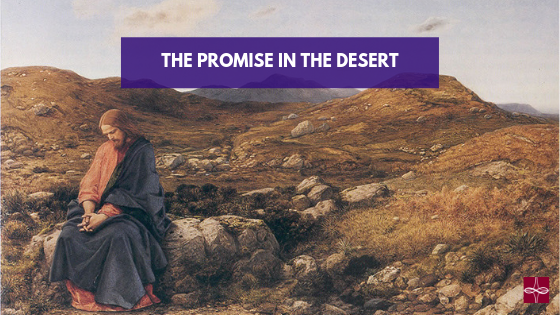

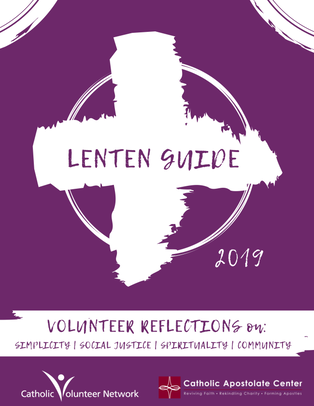
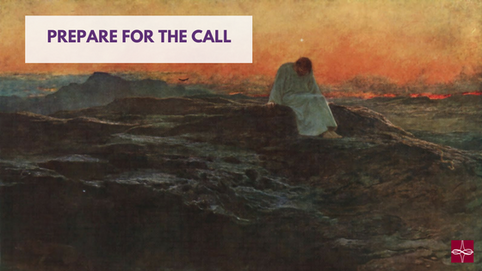

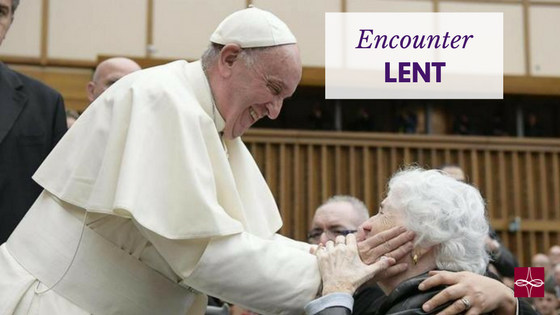

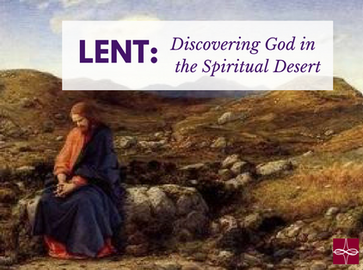

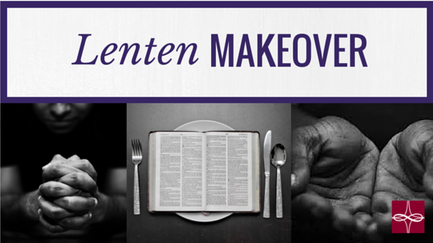


 RSS Feed
RSS Feed